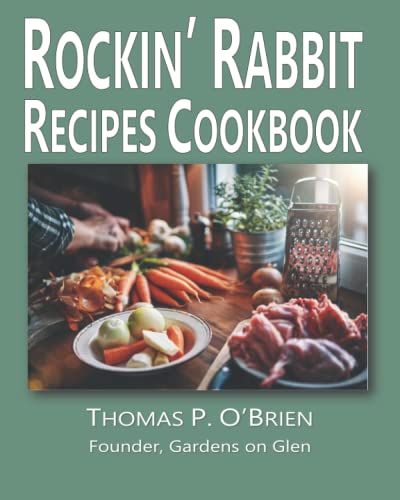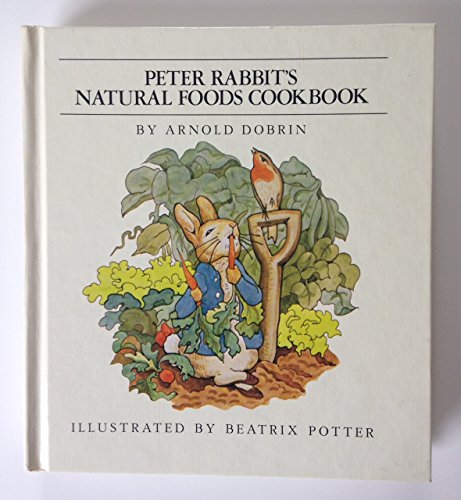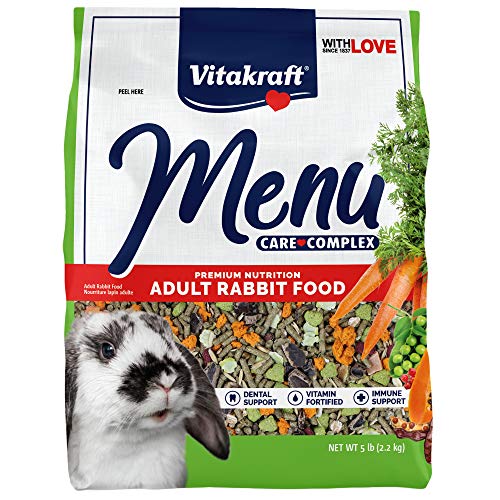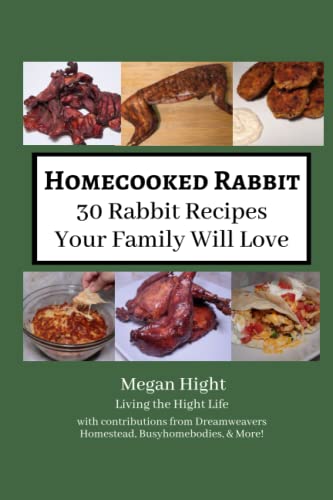You are using an out of date browser. It may not display this or other websites correctly.
You should upgrade or use an alternative browser.
You should upgrade or use an alternative browser.
New to meat rabbits help? Please
- Thread starter Keli
- Start date

Help Support Rabbit Talk Forum:
This site may earn a commission from merchant affiliate
links, including eBay, Amazon, and others.
Flemish giant crosses can make good meat rabbits.
It all depends on what you are looking for though.
I find that they are often more docile than new zealands can be. Not always, and not all new zealands are feisty. Many people tell me that flemish crosses have larger bones, but I haven't weighed new zealand, cali, and Flemish giant mix bones to compare them.
An adult doe with a 3 week old litter is probably the worst possible choice for a beginner to start on. The kits are very delicate at that age. Moving them or changing their diets could stress them greatly. Stressing kits can increase disease susceptibility, lower growth rates, and possibly be fatal if a GI imbalance occurs.
The price is a bit high for meat mutts in my area.
Pedigreed calis and New Zealands are sold around the same price as that buck.
Kits aren't really worth much until they are weaned, because weaning enteritis can cause losses. For that reason, meat breeders judge the value of a doe by how many kits she successfully weans, instead of how many she gives birth to.
Is there something special about these particular rabbits to warrant the higher price tag? (organic, non-GMO fed?)
Why are they selling the doe with a 3 week old litter? Are they getting out of rabbits entirely, and if so, why?
Are they skittish and hard to handle?
Are they sick? (sneezing, diahrea, bloated bellies?)
Do the kits growout too slowly to make them economical?
Is the doe mean? ("Protective" is often used as a coverup term for "animal that bites".) Mean does do NOT make better mothers than calm does.
It all depends on what you are looking for though.
I find that they are often more docile than new zealands can be. Not always, and not all new zealands are feisty. Many people tell me that flemish crosses have larger bones, but I haven't weighed new zealand, cali, and Flemish giant mix bones to compare them.
An adult doe with a 3 week old litter is probably the worst possible choice for a beginner to start on. The kits are very delicate at that age. Moving them or changing their diets could stress them greatly. Stressing kits can increase disease susceptibility, lower growth rates, and possibly be fatal if a GI imbalance occurs.
The price is a bit high for meat mutts in my area.
Pedigreed calis and New Zealands are sold around the same price as that buck.
Kits aren't really worth much until they are weaned, because weaning enteritis can cause losses. For that reason, meat breeders judge the value of a doe by how many kits she successfully weans, instead of how many she gives birth to.
Is there something special about these particular rabbits to warrant the higher price tag? (organic, non-GMO fed?)
Why are they selling the doe with a 3 week old litter? Are they getting out of rabbits entirely, and if so, why?
Are they skittish and hard to handle?
Are they sick? (sneezing, diahrea, bloated bellies?)
Do the kits growout too slowly to make them economical?
Is the doe mean? ("Protective" is often used as a coverup term for "animal that bites".) Mean does do NOT make better mothers than calm does.
Zass has offered a lot of great advice.
I had a Flemish x buck and he was a terrific herd sire but unlike most Flemish he had a very meaty body to go along with thicker bones and he did well on a mostly hay diet - luckily he passed this trait onto his offspring
In my experience the denser bone is a more dominant trait but as long as they stay meaty it is not an issue for me, although it is a bit harder to do a cervical dislocation on big boned rabbits. I have also had California crosses and they had significantly finer bones making it very easy to dispatch them and for my grinder to turn them into ground raw dog food.
I've also dispatched some French Lops - now those guys had HUGE dense bones and I was exhausted after doing just 5
The price depends on your area - meat rabbits range from $10 to $50 around here with the mutts being less expensive and the purebreds more.
I had a Flemish x buck and he was a terrific herd sire but unlike most Flemish he had a very meaty body to go along with thicker bones and he did well on a mostly hay diet - luckily he passed this trait onto his offspring
In my experience the denser bone is a more dominant trait but as long as they stay meaty it is not an issue for me, although it is a bit harder to do a cervical dislocation on big boned rabbits. I have also had California crosses and they had significantly finer bones making it very easy to dispatch them and for my grinder to turn them into ground raw dog food.
I've also dispatched some French Lops - now those guys had HUGE dense bones and I was exhausted after doing just 5
The price depends on your area - meat rabbits range from $10 to $50 around here with the mutts being less expensive and the purebreds more.
I asked her why she is selling them? She said she is too busy and going back to school. The does are 2 years old. She has 1, 9 month old that just weaned a litter. The 2 year olds have had 3 litters each and have lived, how many litters can a rabbit have? Should I ask her to keep them for another 2 weeks then would it be safe to move them ? Thx
TwoAcreDream
Well-known member
Ask her if she can keep them another 2 weeks.
And tell her you are interested but could she work a better deal
for you on the price.
I bought a mom with a litter this summer. I got a package deal. I want
to say they were not quite 6 weeks when I got them. I sold the litter
when they got old enough and mom is still here.
Just have cages ready to put them in once you get them home.
A litter of 9 is going to be ready shortly for growout pens.
And tell her you are interested but could she work a better deal
for you on the price.
I bought a mom with a litter this summer. I got a package deal. I want
to say they were not quite 6 weeks when I got them. I sold the litter
when they got old enough and mom is still here.
Just have cages ready to put them in once you get them home.
A litter of 9 is going to be ready shortly for growout pens.
In theory a rabbit can have a litter every 31 days but it is hard on a doe and they start to wear out and become less productive.
My meat rabbits have 6 to 9 litters a year
My meat rabbits have 6 to 9 litters a year

$18.99 ($0.40 / Ounce)
FAMILY FARM AND FEED | Timothy Grass Food | Small Pet | Young and Adult | Pellets | 3 Pounds
Family Farm and Feed

$9.99 ($0.20 / Count)
BioSwiss Bandages, Bunny Rabbits Shaped Self Adhesive Bandage, Latex Free Sterile Wound Care, Fun First Aid Kit Supplies for Kids and Adults, 50 Count
Verified Wellness

$2.99 ($3.19 / lb)
$6.99 ($7.46 / lb)
Kaytee Alfalfa Cubes for Rabbits, Guinea Pigs, and Other Small Animals, 15 oz
Amazon.com

$9.13 ($36.52 / Ounce)
$9.81 ($39.24 / Ounce)
Flower Essence Services Supplement Dropper, Rabbit Brush, 0.25 Ounce
HerbsDaily

$19.99 ($19.99 / Count)
$20.99 ($20.99 / Count)
The Perfect Match - Flexible Rabbit Vibrator Sex Toy with 10 Powerful Settings for Women & Couples, Waterproof, Rechargeable, Quiet, by Sweet Vibrations (Pink), Vibrating Wand for her Pleasure
Sweet Vibes Toys

$8.37 ($0.14 / Count)
$8.99 ($0.15 / Count)
vH essentials Probiotics with Prebiotics and Cranberry Feminine Health Supplement - 60 Capsules
Amazon.com

$9.99 ($3.33 / Count)
Springtime 3pcs Rabbit Fur Headbands for Women Girls Unique Faux Furry Hair Headband Soft Luxury Headwear Warm Hair Accessories
Chunxia Accessories

$14.98
$27.95
Wild Game Cooking: Over 100 Recipes for Venison, Elk, Moose, Rabbit, Duck, Fish and More
Amazon.com

$3.99 ($0.57 / Count)
$5.83 ($0.83 / Count)
Arm & Hammer for Pets Super Absorbent Cage Liners for Guinea Pigs, Hamsters, Rabbits & All Small Animals | Best Cage Liners for Small Animals, 7 Count Small Animal Pet Products
Amazon.com

$8.99 ($0.90 / lb)
Small World Rabbit Feed for All Rabbits | Provides Complete Nutrition | 10lbs
Amazon.com

$24.48 ($0.24 / Count)
Urinary Support by Sherwood Pet Health (100 Tablets - 60 Grams)
Sherwood Forest Natural Rabbit Foods

$73.99 ($0.09 / Ounce)
Blue Seal Field & Farm - Rabbit Feed 17 Complete | 50 Pound Bag, Premium Rabbit Food, Using Quality Ingredients, Pellets Provide Complete Daily Nutrition for All Rabbit Types
Kent Nutrition Group

$33.99
$39.99
Oxbow Essentials Adult Rabbit Food - All Natural Adult Rabbit Pellets - 25lb.
Amazon.com

$14.92 ($2.98 / lb)
Manna Pro Rabbit Feed | with Vitamins & Minerals | Complete Feed for Rabbits | No Artificial Colors or Flavors | 5lb
Amazon.com
If the does are 2 years old they may not have much breeding life left depending on how hard they have been breed.
grumpy
Well-known member
If the does are open, they may be difficult to breed. A new move..
A new home... Different environment. Different water... All of these can
impact a doe's receptiveness.
Keep that in mind, along with one other thing. "SOME" people are not
completely honest... LOL. Don't believe everything you're told. I've seen this
happen hundreds of times to newcomers. You may be buying a ton of
frustration at a very expensive price.
Flemish crosses.........I've Never Used. Nor owned one for that matter in
the four decades I've raised meat rabbits. I've heard dozens complain about
longer grow-out times. Larger bone to meat ratios. Nothing truly positive
about this cross. Folks "think" bigger is better. With good meat rabbits that
isn't the case. It's the genetic package you're buying that determines your
success or failure.
IF you do your job right. It begins and ends
with you. Good luck, think twice, buy only once. Think long and hard before
you do this. If you're content, then jump-in...the water's not too cold......
most of the time. :x
Note: A doe with nine little ones three weeks old for fifty bucks isn't too
bad of a deal. DON'T expect her? to hold them for another two weeks and
"NOT" want more money for the doe and her litter.
Grumpy.
A new home... Different environment. Different water... All of these can
impact a doe's receptiveness.
Keep that in mind, along with one other thing. "SOME" people are not
completely honest... LOL. Don't believe everything you're told. I've seen this
happen hundreds of times to newcomers. You may be buying a ton of
frustration at a very expensive price.
Flemish crosses.........I've Never Used. Nor owned one for that matter in
the four decades I've raised meat rabbits. I've heard dozens complain about
longer grow-out times. Larger bone to meat ratios. Nothing truly positive
about this cross. Folks "think" bigger is better. With good meat rabbits that
isn't the case. It's the genetic package you're buying that determines your
success or failure.
IF you do your job right. It begins and ends
with you. Good luck, think twice, buy only once. Think long and hard before
you do this. If you're content, then jump-in...the water's not too cold......
most of the time. :x
Note: A doe with nine little ones three weeks old for fifty bucks isn't too
bad of a deal. DON'T expect her? to hold them for another two weeks and
"NOT" want more money for the doe and her litter.
Grumpy.
I would agree with Grumpy, -- and-- I would not sell a good doe with 9 live young for less $.
I talked to her and she said she would keep them for another 2 weeks ! And she say she processes them herself. I asked for a package deal for 2 does and 1 buck and 1 litter, she also has a 1 year old nz doe should I take her and the 1 other doe with her litter rather then the 2 cross does?? Omg so confusing!! :s
Keli":2ydq8zhk said:I talked to her and she said she would keep them for another 2 weeks ! And she say she processes them herself. I asked for a package deal for 2 does and 1 buck and 1 litter, she also has a 1 year old nz doe should I take her and the 1 other doe with her litter rather then the 2 cross does?? Omg so confusing!! :s
If she process them herself, that is good. People who enjoy the taste of rabbit are the best to buy from. Instead of excusing animals with problems, they are more likely to be looking for reasons to eat them.
__________ Sun Dec 21, 2014 8:20 pm __________
When you take the kits at 5 weeks, do your best not to change their diet. Ideally, you could grow them out and butcher them on the exact same feed the previous breeder was using.
In the meantime, you can convert the does to whatever it is you intend to feed. Abrupt food transitions are advised against in most animals, but with rabbits it's a bit different, because GI problems often prove fatal, especially with weanlings.
i wouldn't hesitate to take the lot of them. you can always cull out the ones you don't want. 
She said she would sell the does and her babies (in 2 weeks) and 1 other doe and her buck for $100 is that a good price ? I asked for a package deal... But I have another breeder that sells pure nz for $15 but they are only 3-4 months old .... So confused 
3 proven adults (buck and 2 does) and a litter 9 for $100 sounds good to me.
But if you are just starting out with rabbits then I'd go for a trio of the younger NZ for $45 to see if you like them.
But if you are just starting out with rabbits then I'd go for a trio of the younger NZ for $45 to see if you like them.
I think the adult rabbits are worth the money. She offered a good deal, and the kits would be freezer camped pretty quickly.
It would spare having your first freezer bunnies being kits you lovingly raised. (This was hard for me)
Young, inexpensive rabbits are usually the best choice for those just starting out. But...
"Pure new zealand" can mean anything...Someone sold me a "pure new zealand" kit with dwarf genes earlier in the year... :roll:
There are many people who will assume, or at least call anything pure, especially if it makes a sale.
It would spare having your first freezer bunnies being kits you lovingly raised. (This was hard for me)
Young, inexpensive rabbits are usually the best choice for those just starting out. But...
"Pure new zealand" can mean anything...Someone sold me a "pure new zealand" kit with dwarf genes earlier in the year... :roll:
There are many people who will assume, or at least call anything pure, especially if it makes a sale.







































